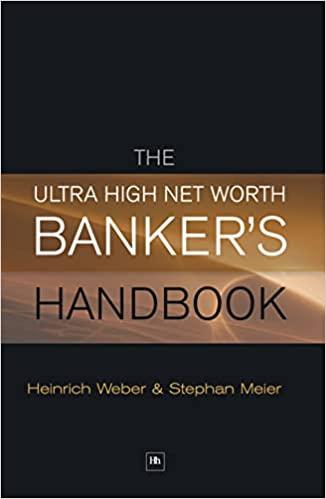Question
ou want to create a portfolio equally as risky as the market, and you have $1,500,000 to invest. Consider the following information: Asset Investment Beta
| ou want to create a portfolio equally as risky as the market, and you have $1,500,000 to invest. Consider the following information: |
| Asset | Investment | Beta |
| Stock A | $300,000 | 0.75 |
| Stock B | $450,000 | 1.25 |
| Stock C | 1.50 | |
| Risk-free asset | ||
| Required: |
| (a) | What is the investment in Stock C? (Do not round your intermediate calculations.) |
| (Click to select) $291,667 $456,000 $451,250 $475,000 $494,000 |
| (b) | What is the investment in risk-free asset? (Do not round your intermediate calculations.) |
| (Click to select) $458,333 $286,000 $275,000 $261,250 $264,000 |
| ou have $30,000 to invest in a stock portfolio. Your choices are Stock X with an expected return of 15 percent and Stock Y with an expected return of 6 percent. |
| Required: |
| (a) | If your goal is to create a portfolio with an expected return of 11.8 percent, how much money will you invest in Stock X? |
| (Click to select) $20,106 $18,366 $20,300 $19,333 $39,333 |
| (b) | If your goal is to create a portfolio with an expected return of 11.8 percent, how much money will you invest in Stock Y? |
| (Click to select) $10,667 $10,240 $11,094 $11,200 $10,134 |
| A portfolio is invested 20 percent in Stock G, 65 percent in Stock J, and 15 percent in Stock K. The expected returns on these stocks are 8 percent, 16 percent, and 29 percent, respectively. What is the portfolio's expected return? |
Multiple Choice
-
14.13%
-
15.53%
-
16.35%
-
17.00%
-
17.17%
| You own a portfolio equally invested in a riskfree asset and two stocks. If one of the stocks has a beta of 1.05 and the total portfolio is equally as risky as the market, what must the beta be for the other stock in your portfolio? |
Multiple Choice
-
1.00
-
2.05
-
0.95
-
1.95
-
1.85
| Consider the following information: |
| Rate of Return if State Occurs | |||
| State of Economy | Probability of State of Economy | Stock A | Stock B |
| Recession | 0.10 | 0.05 | -0.18 |
| Normal | 0.50 | 0.08 | 0.14 |
| Boom | 0.40 | 0.13 | 0.35 |
| Required: |
| (a) | Calculate the expected return for Stock A. (Do not round your intermediate calculations.) |
| (Click to select) 8.69% 8.62% 10.19% 10.09% 9.70% |
| (b) | Calculate the expected return for Stock B. (Do not round your intermediate calculations.) |
| (Click to select) 18.24% 19.97% 20.16% 19.20% 10.33% |
| (c) | Calculate the standard deviation for Stock A. (Do not round your intermediate calculations.) |
| (Click to select) 2.83% 2.94% 2.00% 2.97% 2.69% |
| (d) | Calculate the standard deviation for Stock B. (Do not round your intermediate calculations.) |
| (Click to select) 11.22% 16.50% 16.66% 15.87% 15.07% |
| You own a stock portfolio invested 25 percent in Stock Q, 25 percent in Stock R, 5 percent in Stock S, and 45 percent in Stock T. The betas for these four stocks are 1.8, 1.22, 0.84, and 1.73, respectively. What is the portfolio beta? |
Multiple Choice
-
1.61
-
1.65
-
1.54
-
1.58
-
1.5
Step by Step Solution
There are 3 Steps involved in it
Step: 1

Get Instant Access to Expert-Tailored Solutions
See step-by-step solutions with expert insights and AI powered tools for academic success
Step: 2

Step: 3

Ace Your Homework with AI
Get the answers you need in no time with our AI-driven, step-by-step assistance
Get Started


